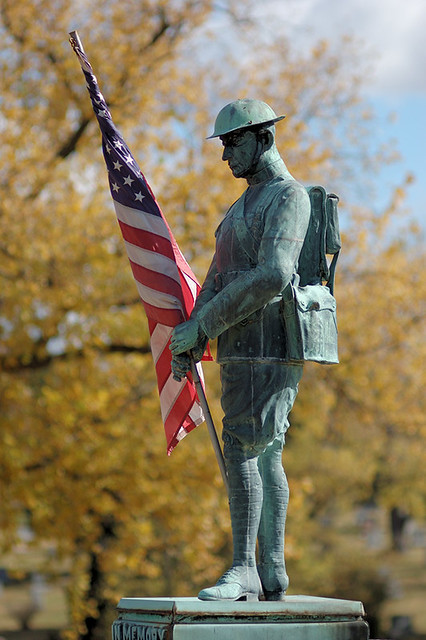
A statue of a Doughboy, or infantry soldier of the American Expeditionary Forces of the First World War. Photo taken one week ago at the Sunset Memorial Park Cemetery, in Affton, Missouri.
The United States fought briefly on the side of Britain and France, primarily opposing Germany and the Austrian Empire, which both prolonged the war, but also lead it to decisive, overwhelming victory.
The warring parties on the Western Front signed an armistice, or halt in hostilities of the war, at 5 o'clock in the morning, on November 11th, 1918, with a cease-fire taking place at 11 a.m., Paris time. Brutal fighting continued right up until “the eleventh hour of the eleventh day of the eleventh month.” The last soldier killed in the conflict before the cease-fire was an American.
This was perhaps the most brutal war in human history up to that point, with about ten million killed, and the cease-fire which ended the war was marked by a new American public holiday, Armistice Day, on November 11. In the Commonwealth countries, this day is known as Remembrance Day. Since the United States already has Memorial Day as a holiday remembering her war dead, Armistice Day was renamed in 1953 to Veterans Day, which honors all those who serve, or have served, in the United States armed services.
But this day is also the feast day of Saint Martin of Tours (A.D. 316-397), patron saint of soldiers. Martin was a soldier in the Roman Imperial army and later was Bishop of Turones in Gaul (now Tours, France). His feast day undoubtably was an influence on the date of the Armistice. The patronage of Saint Martin is important in strengthening the male laity's involvement in the Church, and he serves as a good role model for patriotism, even when men are living in a State hostile to Christ.


"But this day is also the feast day of Saint Martin of Tours (A.D. 316-397), . . .His feast day undoubtably was an influence on the date of the Armistice." Hmmm, I wonder why the leaders of the EU are unaware of this.
ReplyDelete